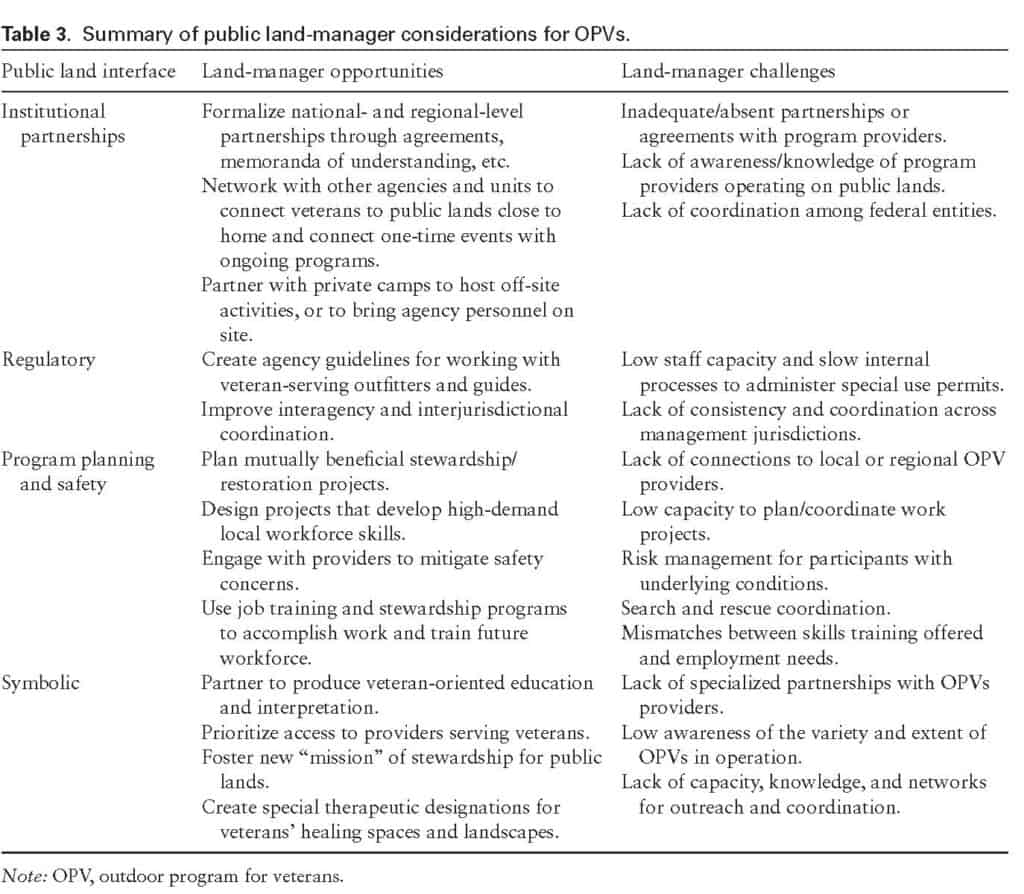
Recent paper in the Journal of Forestry. Here’s the citation:Outdoor Programs for Veterans: Public Land Policies and Practices to Support Therapeutic Opportunities
MM Derrien, LK Cerveny, DG Havlick – Journal of Forestry, 2020
IMHO this is a super-interesting paper. Because we’ve been talking about FS culture recently, I excerpted some relevant paragraphs below but there are many other topics worthy of discussion. Here’s the paper.
OPV providers shared accounts of the practical challenges of identifying and interacting with the appropriate people within agency bureaucracies to meet their program needs. One described the “pretty universal struggle to make the right kind of connections with land managers.” Furthermore, some OPV providers described agency biases against group uses, which challenged the opportunities they saw for organized groups to increase access and promote responsible behaviors among new and experienced public land visitors. One interviewee explained:
… when a lot of the federal laws and regulations, and practices were established, through permitting in the [19]60s and ’70s and ’80s, groups were seen as hostile to the outdoors … If you’re a group, you have hoops you have to jump through … That can be an impediment to getting groups outdoors. The sheer amount of paperwork.Some interviewees pointed to an agency culture that views group activities as a threat to values of solitude and “primitive qualities” on public lands. One land manager contrasted the idea of hosting large groups with land-protection practices favoring individual users: “Our people were hired to protect the land, so there is a reluctance to entertain people … The system is set up to … achieve solitude.” A common practice among land-management agencies is that if there is a program-participation fee, then a special use or event permit (and associated fees) is required of the program organizer. This process was seen as cumbersome, slow, and impractical by some providers. Groups over a certain size also often require different permissions. As one
land manager described his experience in the USFS:
I was a permit administrator earlier in my career, and if the Girl Scouts wanted to go and do something, but there were already too many of them …it’s going to cost them a couple thousand dollars to have a picnic … It’s kind of absurd, but it’s true.
That’s our policy, and sometimes you have a manager that says, “This is ridiculous. I’m going to go let them do it.” And then you have another who says, “I’m not going to let them do it.”
The interaction with these bureaucratic processes can be stressful for OPV providers. As one provider shared:
[The district ranger] appreciates what we do, but she staffs a bureaucracy, and we fall into any other permittee sort of pool … Every time I get an email from her, or heaven forbid a phone call, I start to sweat. It’s like, “My God, I think ultimately she wants to pull our permit, she doesn’t see the value of what we’re doing, she wants only to fulfill the obligatory bureaucratic hurdles that she’s burdened with” … I applied for [another permit], and you know, you’d think I was going to open a strip mine.According to agency personnel and OPV providers alike, one outcome of these bureaucratic hurdles is that some providers avoid interacting with land managers altogether, and some operate on public lands without going through required permit processes. The lack of agency knowledge or engagement for some OPVs generates a variety of concerns. As one program provider cautioned: “There is a lot of veterans’ groups, and a lot of groups in general that go out to these places and they don’t have a risk management plan. They don’t have an insurance plan … 60–80 percent of these organizations are guiding illegally.” Whether or not this estimate is accurate, interviewees pointed to the need to encourage and enhance relations in the interest of improved program delivery and safety
This makes me wonder if common practices in the offroad world technically violate permit rules, which is an area I haven’t really looked into. If a Jeep club does trail runs for only its paid members, is that illegal guiding, or is it only if they charge a fee for that specific event? I know large Jeep rallies like Easter Jeep Safari or the Mile High Jeep Club’s annual All4Fun event need permits, but at what size does that actually become a requirement?
I wonder about any group that collects dues and organizes a hike? Hopefully someone out there understands this.
“When do I need an authorization?
If you will need to occupy, use, or build on NFS land for personal or business purposes, whether the duration is temporary or long term.
If there is a fee being charged or if income is derived from the use.
If an activity on NFS land involves individuals or organization with 75 or more participants or spectators.”
https://www.fs.fed.us/specialuses/special_app_process.shtml#sp-app-b